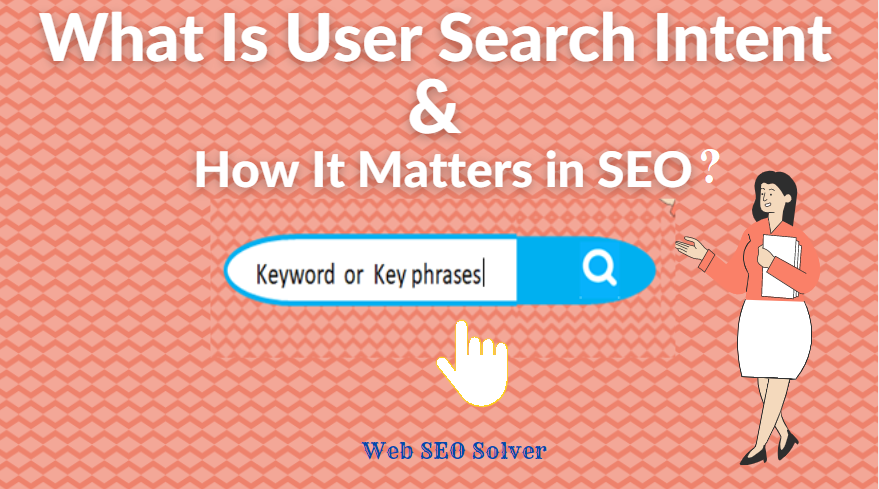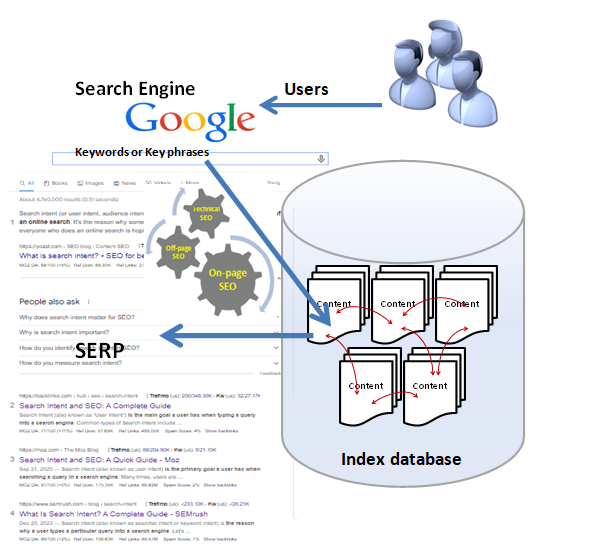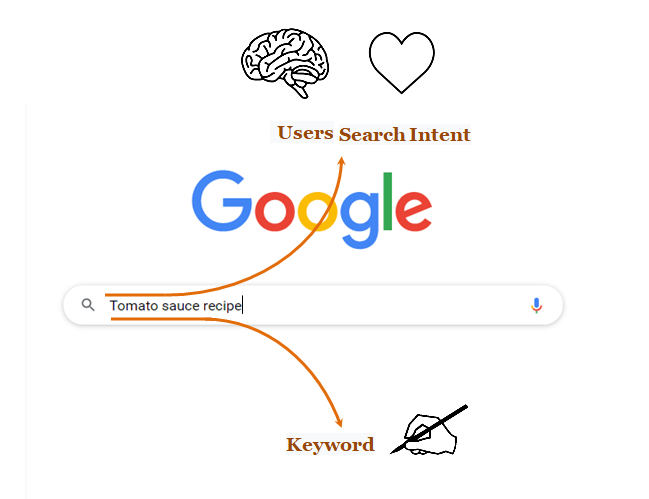
What is user search intent and how it matters in SEO?
user search intent and SEO
Table of Contents
What is user search intent?
User search intent is simply an intention of a user to know his query answer while typing the query in the search bar of a search engine.
It is the words of heart and mind, an invisible ingredient.
This intent is a crucial factor to search engines that helps the system decide which results are to be shown for the user’s query.
We can determine it by analyzing the keywords and phrases the users are typing into the search engine or the content they are clicking on.
All the keywords and phrases like this generally go under any 1 of 4 types of search intent.
They are 1) informational 2) Navigational 3) Commercial. and 4) Transactional
You need to find out which intent fits your keywords best and know the same search term may have different user intent.
All the Search Engines are struggling hard to improve their algorithm to determine the user’s search intent of the queries perfectly and to identify the real answer that matches the search intent best.
The mission is to show the best answers in the SERP under a search query and rank the contents that fit both the search query and the search intent well.
Let’s consider the other side of the system, the businessmen need to know the user search intent to recognize the clients and their behaviors.
The content creators need to know the intent of the search query to create high-quality content that provides real information to the users.
For all these, it is essential to prioritize the user search intent over everything else, when creating content in 2023.
How does User Search Intent Matter in SEO?
SEO is a process of optimizing content under the keywords to rank it in the SERP. It improves the ranking position of a site.
Google system is devoted to ranking the relevant and real answers to the search query following SEO guidelines.
It is not easy for search engines to pick the best relevant and real answers from hundreds or thousands of posts in the database under the same keyword.

Google considers more than two hundred factors to rank a site in the SERP.
The most essential factor of them is users’ search intent and it is considered as a key factor to Google that help determine which results are returned for a user’s search query.
Google’s system tries to decipher the intent behind the query and rank the contents that match well with this intent of the users.
The goal of it is to satisfy the user’s intent completely by providing the results that best fit.
So, before you start creating high-quality content, you need to know first user search intent behind the keyword before you target to make the strategy for your content and decide the content goal.
Every keyword conveys a specific intent of the users. But, a keyword may have multiple intents too.
So, optimizing keywords is not all. Rather, satisfying intent with keyword optimization brings better results.
The content that answers best the user’s intent and user search query gets a good user experience and ranks high in the SEO game.
While writing content, provide actual information in your content that the users are searching.
By doing this, your content will provide full satisfaction to the users.
They need not go to multiple sites for satisfying incomplete intent.
But, remember that if your content doesn’t match the intent of the users all your tasks will be meaningless.
Google system is now smart enough to check this factor and prioritize it to pick the best answers to the search query and ultimately rank them according to quality standards.
For example, if a user is looking for a sauce recipe, they may type “Tomato sauce recipe” into a search engine. If your content is optimized well for this type of keyword as well as provide original information on tomato sauce recipe to answer user intent, your content will likely rank first in the results.
So, user intent is one of the most important factors in the SEO game.
What is user search intent and how it matters in SEO?
How to identify user intent and optimize it in the content?
User intent is the key to content optimization. You must understand what users are looking for in order to optimize your content for maximum engagement.
Here are five tips for understanding user intent and optimizing it in content:
1. Understand the audience’s needs.
One way to understand user intent is to understand what your audience needs. Are they looking for information, entertainment, transactional data or help? You can ask yourself what the user is trying to do.
Once you know what your audience wants, you can tailor your content accordingly.
2. Analyse user behavior
Another way to understand user intent is to analyze your user behavior. What are users clicking on? What are they spending the most time on? Also learn the demographic, interest,s and geo-information of the users.
Google Analytics data can help you provide details in this regard.
This information can help you to identify the exact user’s intent and behavior. After identifying them, optimize the content as they crave to know.
3. Analyse User Intent
Once you identify the user intent start to make an analysis with it. Usually, intent stimulates a user to generate a search query by typing a phrase or keyword in the search bar. But this typing does not cover the user intent completely.

So, a keyword or phrase is a physical expression of user intent. It includes more implicit meaning. You need to bring out it while optimizing for intent.
One of the most common ways to determine this is to arrange a survey or interview. By asking a set of questions about the user’s needs, you can get a good understanding of what the user is actually looking for. This information can then be used to optimize the content.
For example, you have made a search for “The best Restaurant in London”. This typing in the search bar is a keyword, a physical expression of your intent.** There is more hidden information. They might be reviews, locations, maps and images, etc that can prove the restaurant is the best one and help you to access it easily.
So, while optimizing the content, you need to add them for making the best result of the user search query.
4. Be aware of the user’s current context and situation.
You should constantly be aware of your user’s current context and situation. For example, if a user is looking at a product page on your website, you can keep track of what page they are on, what product they are looking at, and what sections of the page they are viewing.
This allows you to provide them with the best possible experience based on their current context.
5. Optimize your content that meets the user’s need
There are a few things you can do to optimize your content for different intents :
1. Sell.
If your goal is to sell products or services, make sure the user search intent of your content is transactional and your content should be targeted to sell products.
So, select transactional keywords and optimize them in your content well. Use images, headings, and other elements to help your audience find what they’re looking for.
2. Inform.
If your goal is to give your audience information, make sure your user intent is informational. So, optimize your content with the genuine information that your audience is actually looking for.
3. Build brand
If your goal is to satisfy the navigational intent of the users, build a website to create a strong brand of your niche. Make it as a resource so that visitors visit your site continuously.
Conclusion
In conclusion, search intent is a matter in SEO. This is because search engines use search intent to determine which pages to rank in their search results.
So, by understanding the types of user queries and user intent you can create relevant and engaging content by optimizing keywords and user intent well which will help to improve your site’s ranking.
What is user search intent and how it matters in SEO?
Related Term :
